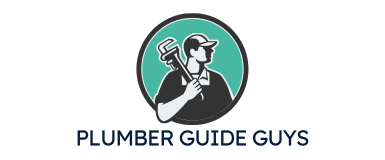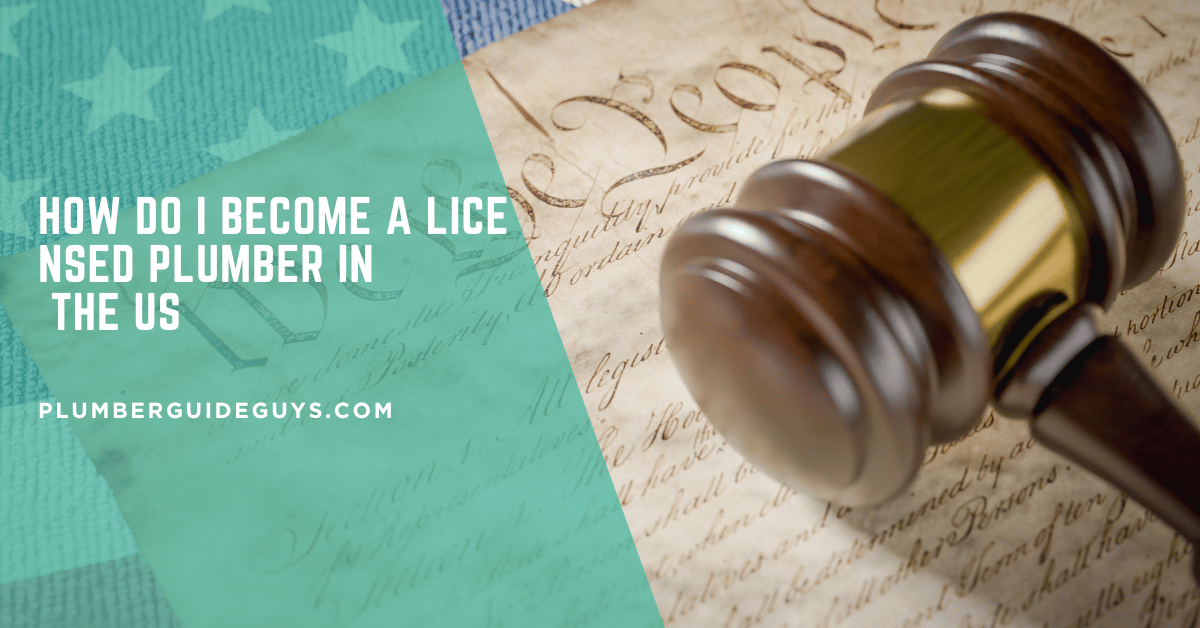Affiliate Disclosure
Plumber Guide Guys is a participant in the Amazon Services LLC Associates Program, an affiliate advertising program designed to provide a means for sites to earn advertising fees by advertising and linking to Amazon.
How Do I Become a Licensed Plumber in the US? Did you know the plumbing industry makes $134 billion a year in the US? It’s a field that’s both exciting and stable. If you’re thinking about becoming a licensed plumber, you’re in good company. The need for skilled tradespeople keeps growing, making plumbing a great choice for a secure and rewarding job.
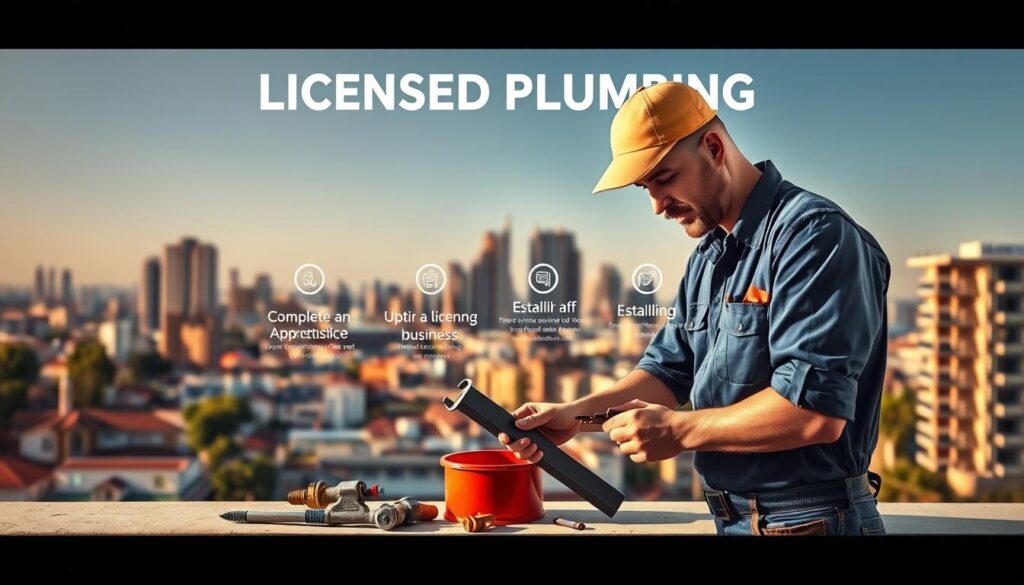
To become a licensed plumber, you need to be dedicated and plan well. Your path will include lots of training, hands-on experience, and meeting certain plumbing apprenticeship requirements. You can choose from trade schools or apprenticeships to reach your goals in this vital trade.
Plumbing is more than just a job—it’s a career with lots of room to grow. You can work in homes, businesses, or big industrial sites. Knowing how to become a licensed plumber will lead you to a fulfilling and successful career.
Key Takeaways
- Plumbing is a $134 billion industry with significant career opportunities
- Multiple educational pathways exist for becoming a licensed plumber
- Apprenticeships are key for getting practical skills and experience
- Licensing rules differ by state
- The career offers stable work and good pay
Table of Contents
Understanding the Plumbing Industry Landscape
The plumbing industry is key to our homes and buildings in the U.S. Knowing about it can guide you in choosing a plumbing career.
Current Market Value and Growth
The plumbing field is growing strong and steady. Skilled plumbers are in high demand. Getting certified can put you in a great spot for future growth.
- Projected industry growth: 5% over next decade
- Increasing infrastructure renovation needs
- Expanding residential and commercial construction markets
Employment Statistics and Job Security
Plumbing jobs are very secure. The steps to become a journeyman plumber lead to a stable career. Your skills will always be needed.
| Employment Metric | Current Statistics |
|---|---|
| Total Plumbers Employed | 470,000+ |
| Annual Job Growth | 4.5% |
| Unemployment Rate | 2.3% |
Average Salary Expectations
Your salary in plumbing depends on your experience, where you work, and your specialty. Professional certifications can really increase your earnings.
- Entry-level plumbers: $35,000 – $45,000
- Journeyman plumbers: $50,000 – $70,000
- Master plumbers: $75,000 – $100,000+
“The plumbing industry offers stable, well-paying careers for skilled professionals willing to invest in their education and skills.” – National Plumbing Association
Basic Requirements for Starting a Plumbing Career
Starting a plumbing career means knowing the basics first. Most states have rules for getting started. Your first step is getting a good education.
To start in plumbing, you need to meet a few key points:
- High school diploma or equivalent (GED)
- Minimum age of 18 years old
- Strong physical fitness and manual dexterity
- Basic math and problem-solving skills
Being physically fit is key for plumbing. Plumbers need to lift heavy things, work in small spaces, and stay focused for long hours. Your physical strength affects your success in this field.
“Success in plumbing isn’t just about technical skills, but also about physical resilience and mental sharpness.” – Professional Plumbing Association
Employers also look for certain personal traits:
- Attention to detail
- Strong communication skills
- Customer service orientation
- Mechanical aptitude
Your love for solving problems and wanting to learn more will make you stand out. Getting master plumber licensing takes hard work, technical skills, and a drive to grow professionally.
Educational Pathways in Plumbing
Starting a career in plumbing needs careful thought about your education. You can choose from many paths, each with its own benefits for those looking to become apprentice plumbers.
There are several educational paths for those wanting to enter the plumbing trade. Knowing these options helps you decide the best path for your career.
Trade School Programs
Trade school programs mix classroom learning with hands-on skills. They cover important topics like:
- Pipe system design and installation
- Safety protocols and regulations
- Blueprint reading
- Modern plumbing technologies
Apprenticeship Opportunities
Apprenticeships offer a great way to learn by doing. They combine classroom lessons with real-world experience, letting you earn while you learn.
- Typical apprenticeship duration: 4-5 years
- Average annual program cost: $4,000-$5,000
- Includes supervised on-site training
- Direct mentorship from experienced professionals
Online Training Options
Online learning has changed plumbing education, making it more flexible. Online programs offer:
- Theoretical coursework anytime
- Lower cost range: $800-$1,000
- Self-paced learning modules
- Supplemental certification opportunities
Each educational path has its own advantages. Your choice depends on your learning style, budget, and career goals in the plumbing industry.
How Do I Become a Licensed Plumber
Becoming a licensed plumber takes hard work and a clear plan. You’ll go through many steps to turn your interest into a real job.
- Finish high school or get a GED
- Sign up for a vocational program or trade school
- Start an apprenticeship program
- Get real-world experience
- Learn about plumbing codes
- Pass the licensing test
Your apprenticeship is key. You’ll work with pros, learning by doing. Apprenticeships last four to five years, giving you the needed experience.
Knowing plumbing codes is vital. You’ll study rules for safe plumbing work. This ensures your work meets high standards.
| Career Stage | Duration | Key Requirements |
|---|---|---|
| Apprenticeship | 4-5 years | 2,000 work hours per year |
| Licensing Exam | 6-12 months | Comprehensive plumbing code test |
| Journeyman License | Ongoing | Continuing education credits |
Remember, licensing rules differ by state. So, check your local laws. Hard work, learning, and experience are your path to success.
Cost of Plumbing Education and Training
Starting a plumbing career needs good financial planning. Knowing the costs of plumbing apprenticeships and training helps you plan your budget for the future.
Tuition and Program Fees
Getting into plumbing involves spending money. Technical and trade school programs cost between $1,250 and $3,000 for certificates and diplomas. These programs last one to two years and cover all you need to know for apprenticeships.
- Certificate programs: $1,250 – $2,000
- Diploma programs: $2,500 – $3,000
- Community college courses: Often more affordable
Tools and Equipment Expenses
Plumbers need special tools to do their job. You’ll spend about $2,000 on tools during your training and early career. This includes basic hand tools, safety gear, and plumbing tools.
- Basic tool kit: $500 – $1,000
- Safety equipment: $300 – $500
- Specialized plumbing tools: $500 – $1,000
Licensing and Certification Costs
Getting a plumbing license and certification costs more. Licensing fees are $100 to $300, depending on your state. Don’t forget exam prep and testing fees.
- Initial licensing exam: $150 – $250
- Plumbing license renewal: $50 – $150 every 2-3 years
- Continuing education courses: $100 – $300
Pro tip: Some employers and trade unions offer financial help or reimbursement for education and licensing costs. Look into these options to reduce your expenses.
State-Specific Licensing Requirements
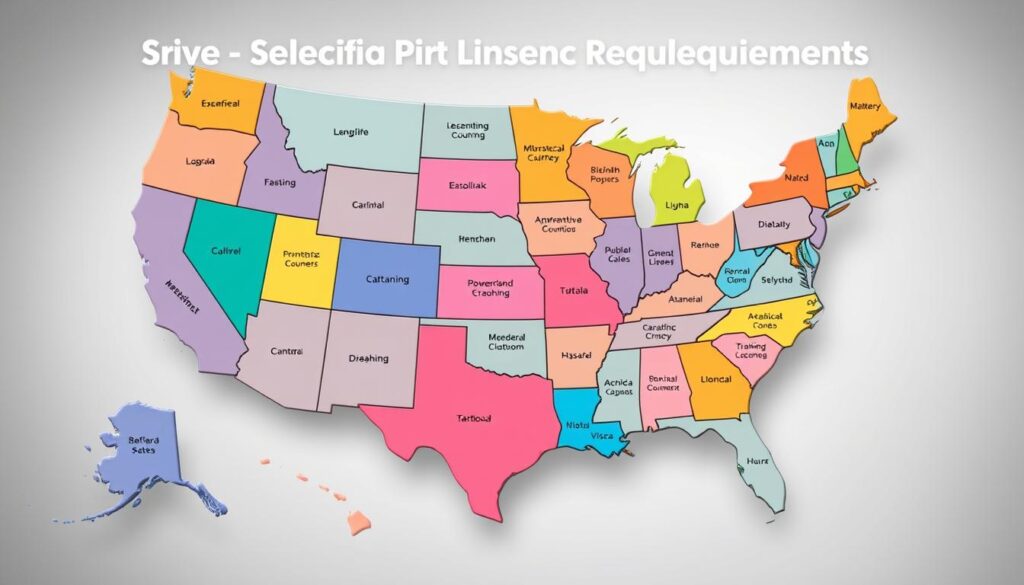
Getting a plumbing license can be tricky because each state has its own rules. You should start by learning about the local laws that apply to plumbing work.
Plumbing codes differ a lot from one place to another. Some states have strict rules, while others are more relaxed. It’s important to know what your state requires before you start working.
- Check your state’s licensing board website
- Review specific education and examination requirements
- Understand local continuing education mandates
- Verify reciprocity agreements with neighboring states
Pro tip: Contact your state’s professional licensing department for the most current and accurate information about plumbing certification processes.
“Knowing your state’s specific requirements is the first step to becoming a licensed professional plumber.” – Professional Plumbers Association
Here are some important things to think about for state-specific licensing:
- Minimum age requirement (typically 18 years)
- Required hours of apprenticeship
- Passing state-administered exams
- Background check and documentation
Remember, knowing the plumbing codes is key. Each state has its own rules, which can affect your journey to becoming a plumber. Spend time learning these details to start your plumbing career on the right foot.
Types of Plumbing Licenses and Certifications
Understanding plumbing licenses can be tricky. The plumbing field has many certification levels. These levels help you grow in your career and show your skills. Knowing the steps to get a journeyman plumber license is key for those looking to improve their skills and pay.
The plumbing world has three main license levels. Each level shows a different stage of your career:
- Apprentice License
- Journeyman License
- Master Plumber License
Apprentice License: Your Starting Point
An apprentice license is your first step in plumbing. It lets you work under a pro while you learn. To get this license, you must:
- Finish a state-approved training program
- Sign up with local licensing boards
- Work with a licensed journeyman or master plumber
Journeyman Plumber License: Advancing Your Career
To get a journeyman plumber license, follow these steps:
- Complete 4-5 years of apprenticeship
- Pass a big licensing exam
- Show you can do plumbing well
Master Plumber License: Reaching Professional Excellence
Getting a master plumber license is the top achievement in plumbing. You need:
- At least 5-7 years of work experience
- Deep technical knowledge
- Pass a tough state exam
Each license level means more responsibility, better pay, and more respect in the plumbing world.
Career Advancement Opportunities
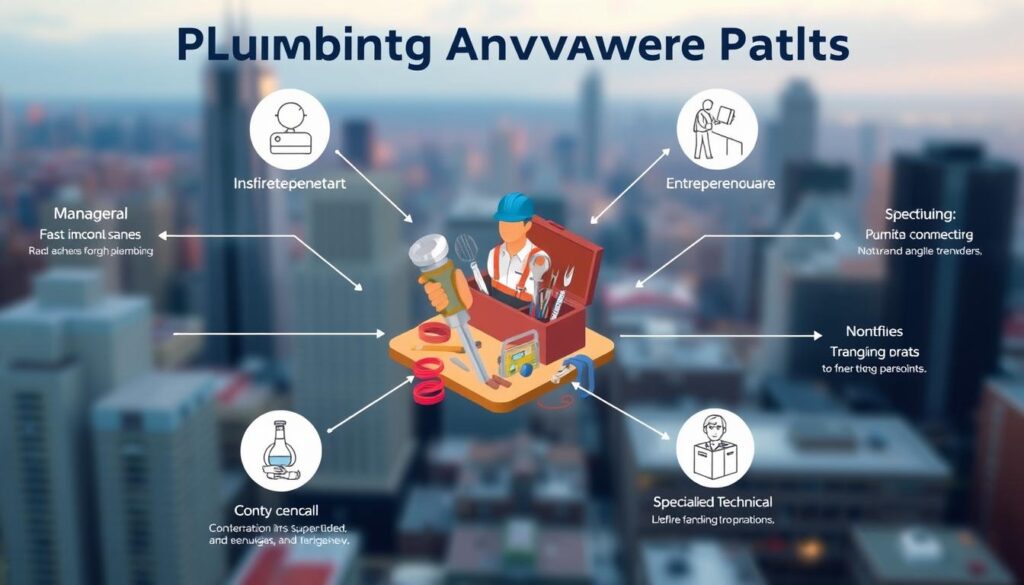
Being a licensed plumber opens doors to more than just fixing pipes. The path to becoming a plumber is filled with chances to grow and earn more.
After finishing your plumbing school, you can take on many exciting roles:
- Specialized Technical Roles
- Gas fitting specialist
- Medical gas systems technician
- Green plumbing technologies expert
- Management Positions
- Project manager
- Construction site supervisor
- Plumbing department leader
- Entrepreneurial Paths
- Independent business owner
- Plumbing inspection consultant
- Training and education specialist
Your journey starts as an apprentice and moves up to journeyman and then master plumber. Each step means more duties, skills, and money.
| Career Level | Average Salary | Key Responsibilities |
|---|---|---|
| Apprentice | $35,000 | Learning fundamental skills |
| Journeyman | $55,000 | Independent work, complex installations |
| Master Plumber | $85,000+ | Advanced projects, business management |
Keep learning to move up in your plumbing career. Stay current with new tech, go to workshops, and get more certifications to stay ahead.
Essential Skills and Qualifications
To be a great plumber, you need both technical skills and personal traits. Your training will teach you important skills that go beyond just fixing pipes. Being physically strong and having good hand-eye coordination are key for everyday tasks.
Aspiring plumbers should focus on these technical skills:
- Blueprint reading and interpretation
- Pipe fitting and welding techniques
- Understanding complex plumbing systems
- Advanced mathematical calculations
Knowing plumbing codes is vital. You’ll learn about local and national building rules. This ensures all installations are safe. You’ll need to pay close attention to details and keep learning.
Soft skills are also critical in your plumbing career:
- Strong communication with clients and team members
- Problem-solving abilities
- Customer service orientation
- Adaptability to new technologies
Being physically fit is essential for plumbers. The job requires stamina, flexibility, and the ability to work in tough conditions. Your training will prepare you to handle the physical demands of this job.
“Success in plumbing comes from combining technical expertise with genuine customer care.” – Professional Plumbing Association
Business Aspects of Professional Plumbing
Starting a plumbing business is more than just knowing how to fix pipes. Plumbers need to understand business and follow rules to keep their licenses. This includes staying up to date with industry laws.
Knowing the key business parts can turn your plumbing job into a successful business. Good planning and smart choices are key for lasting success.
Insurance Requirements
Getting your business insured is the first step to protection. Most places require certain insurance for plumbers:
- General Liability Insurance
- Workers’ Compensation Insurance
- Commercial Auto Insurance
- Professional Liability Coverage
Legal Considerations
Understanding legal needs is vital for keeping your plumbing license and reputation. Important legal points include:
- Getting the right business licenses
- Registering your business type
- Knowing local building codes
- Keeping certifications current
Business Planning Strategies
A solid business plan is key for plumbers to grow. Focus on these important areas:
- Financial management tracking
- Marketing and getting new clients
- Hiring and training employees
- Investing in technology and equipment
Success in plumbing comes from knowing both the technical and business sides. Keep learning and planning to build a strong, profitable plumbing business.
Conclusion
Starting a career as a licensed plumber is both exciting and stable. The process requires dedication but offers great rewards. Plumbers can earn up to six-figure salaries, making it a promising career.
To become a licensed plumber, you need to go through education, apprenticeship, and certification. Each step teaches you important skills. These skills turn you into a respected plumber. The rules for getting licensed vary by state, but the main focus is on technical knowledge and practical skills.
Your success in plumbing depends on always learning and striving for excellence. There’s a high demand for plumbers in the U.S., which means job security and chances for advancement. You can work in homes, businesses, or even start your own plumbing company.
By following this guide, you can confidently start your journey to become a licensed plumber. You’ll get the technical training, practical experience, and certification needed for a rewarding and stable career in a vital industry.
